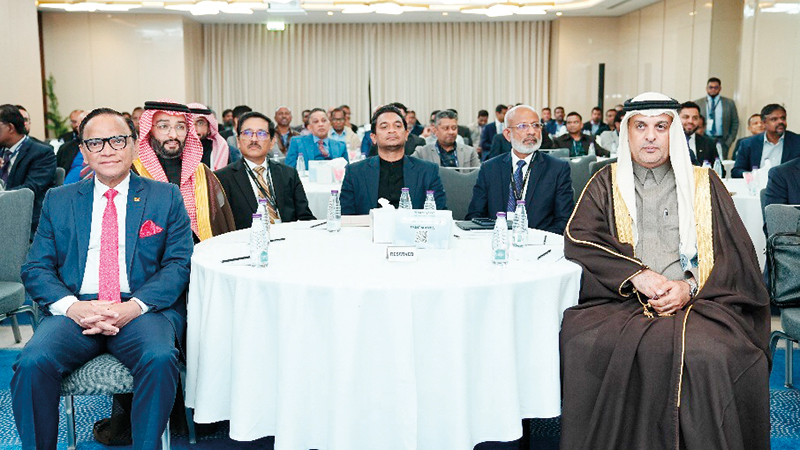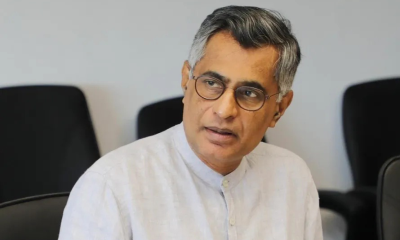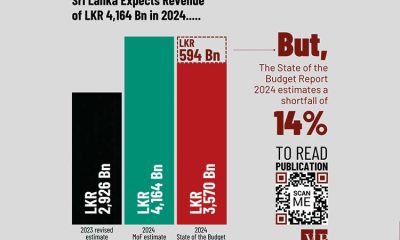Business
VAT hike likely to benefit mobile phone importers in gray market, further erode govt tax revenue

A group of authorized mobile phone importers in Sri Lanka expressed their deep concern over the Sri Lankan government’s decision to remove mobile phones from the Value Added Tax (VAT) exemptions list, coupled with a simultaneous increase in VAT from 15% to 18%, effective January 1st, 2024.
This dual impact wherein devices now not only face a sudden VAT imposition, but also at a significant rate of 18%, pose substantial challenges for the industry and the country.The importers urgently call for a critical reassessment by the authorities in light of these compounded challenges.
The timing of the VAT hike is particularly challenging for authorized mobile phone importers in the country. These companies have collaborated with the Telecommunications Regulatory Commission of Sri Lanka (TRCSL) to find viable solutions to the challenges of parallel imports. Parallel imports, or grey market goods, involve the import and sale of branded products in a market without the trademark owner’s consent. This issue has already caused a tax revenue loss of LKR 3.1 billion (USD 9.4 million) and a Forex outflow of LKR 31.6 billion (USD 96 million) via illegal channels in Sri Lanka.
With the sudden VAT increase, this loss is estimated to rise to 11.9 billion LKR, marking a substantial increase in tax revenue loss from illegal imports. Additionally, there is a projected further tax revenue loss to the government, amounting to a LKR 2.5 billion decline from legitimate imports. This decline is anticipated due to increased parallel import products driven by the rising prices of genuine products.
Moreover, the ramifications extend beyond the economic landscape. Over 10,000 direct job opportunities are now at risk, leaving families dependent on the industry—more than 15,000, including those involved in logistics, printing, branding, advertising, etc.—facing uncertainty. The policy change also jeopardizes direct Forex investment for market development by principals (ATL/BTL), putting this crucial financial support at risk. Furthermore, the spectre of a national security threat looms as parallel imports introduces unknown devices to the country, creating challenges in tracking these products.
Authorized mobile importers emphasize the unfortunate timing of removing cellular and electronic devices from the VAT-exempted list and the hike in VAT given the ongoing efforts by legal importers to find solutions for the persistent Parallel Imports (PI) issue.
Accordingly, the industry had put forward practical suggestions and is actively engaged in collaboration with the TRCSL to explore viable solutions which include proposing an option for registering already in-use PI devices at a nominal fee, introducing a Tourist SIM for the duration of the incoming visitor’s VISA period, and implementing whitelisting of non-registered IMEI from mobile networks. These initiatives aim to holistically address the challenges posed by parallel imports, foster regulatory compliance, and contribute to the development of effective policies that strike a balance between industry interests and regulatory requirements. However, the sudden imposition of VAT, and at an alarmingly high percentage while the industry was working with the TRCSL, is deeply concerning. Similar situations have been observed in countries like Pakistan and Nepal.
The absence of effective measures to restrict parallel imports before imposing taxes impacts legitimate imports and results in a substantial loss in government revenue. Authorized mobile importers stress the critical necessity for the government of Sri Lanka to prioritize and implement a viable solution for the parallel import problem before imposing additional taxes on the industry. This approach is urgent and essential to safeguard the industry’s interests and the government’s fiscal well-being.
On the 1st of December 2023, a meeting convened involving the TRCSL, leading mobile brands and authorized importers. The assembly of mobile importers present included Thushara Ratnaweera and Chaminda Silva representing Samsung, alongside Rajeev Gooneratne and Charles Wijesuriya from Gnext, Prasanna Weerakoon of JKOA, Chathura Jayawardena and Sha Bulathsinhala from Abans, and Gurubaran and Sanketh Gihan representing Vivo.
Business
A Historic First: Sri Lanka’s capital market leaders bring investor forum to Saudi Arabia

The Securities and Exchange Commission of Sri Lanka (SEC) and the Colombo Stock Exchange (CSE), in association with the Embassy of Sri Lanka to the Kingdom of Saudi Arabia, successfully convened an investor forum on Saturday 24th January 2026 at the Radisson Blu Hotel, Riyadh Convention & Exhibition Center. Alongside the forum, the SEC and CSE facilitated a meeting with the Public Investment Fund (PIF) which is Saudi Arabia’s main sovereign wealth fund.
The forum was organized to engage directly with the vibrant Sri Lankan expatriate community in the Kingdom and international investors, highlighting compelling opportunities within Sri Lanka’s capital market following the country’s successful exit from sovereign default and restoration of macroeconomic stability.
The forum was marked by the presence of several senior level policy officials, market leaders and market regulators including; Dr. P. Nandalal Weerasinghe, Governor of the Central Bank of Sri Lanka (CBSL); Chathuranga Abeysinghe, Deputy Minister of Industry and Entrepreneurship Development; Ameer Ajwad Ambassador of Sri Lanka to the Kingdom of Saudi Arabia.; Senior Prof D.B.P.H. Dissabandara, Chairman of the SEC; Ray Abeywardena, Director of CSE; and Dr. Naveen Gunawardane, Co-Founder and Managing Director of Lynear Wealth Management.
In his welcome address, Ameer Ajwad stated, that a significant opportunity remains in broadening public participation in the capital market of Sri Lanka. As financial literacy and investment awareness among potential investors are limited, the investor forum would serve to bridge the knowledge gap. The forum offered an excellent opportunity for first-time investors, overseas investors, and those seeking to enhance their knowledge, to learn how to invest prudently, manage risk, and build wealth with discipline and confidence. Ambassador invited participants to make full use of the presence of high-level authorities from Sri Lanka’s key financial institutions, such as the Central Bank of Sri Lanka, the SEC, and the CSE, and to explore investment opportunities in Sri Lanka’s capital market, not only as a pathway to financial growth but also as a meaningful contribution to Sri Lanka’s resilience and long-term prosperity.
Business
CIC Holdings’ 9MFY26 revenue reaches Rs.70 bn

Agriculture-rich diversified conglomerate CIC Holdings PLC (CSE: CIC) recorded a consolidated revenue of Rs. 70.28 billion for the nine months ended 31 December 2025 (9MFY26), reflecting an increase of 8.69% YoY compared to the corresponding period of the previous year.
The Group’s gross profit increased by 10.11% to Rs. 18.42 billion, with the gross profit margin for the period under review improving to approximately 26%, supported by disciplined pricing and product mix optimisation. Profit after tax (PAT) increased to Rs. 5.97 billion from Rs. 5.70 billion in the corresponding period of the previous year, despite losses incurred in parts of the Group’s agri operations following the impact of Cyclone Ditwah, which disrupted cultivation activity during the Maha season.
The Group’s Crop Solutions sector remained the largest contributor to consolidated revenue, accounting for approximately 44.7% of total revenue, followed by Livestock Solutions at 21% and Health & Personal Care at 20.18%. The remaining sectors, Industrial Solutions and Agri Produce, contributed 8.6% and 6.4% to Group turnover respectively. Health and Personal Care , particularly export-driven product lines, recorded improved performance during the period, alongside continued growth in feeds, poultry, and veterinary care solutions, which supported the Group’s overall operating results.
Despite cyclone-related disruption to cultivation cycles, the Group delivered a strong operating performance, with EBITDA and operating profit (EBIT) both recording year-on-year growth. Operating profit (EBIT) closed at Rs. 9.67 billion, compared to Rs. 8.62 billion in the corresponding period of the previous year, reflecting the strength of the Group’s diversified portfolio and disciplined cost management.
During the period in review, key Group businesses across the five industry sectors, namely Crop Solutions, Agri Produce, Livestock Solutions, Industrial Solutions, and Health & Personal Care, continued to perform resiliently. Crop Solutions revenue increased from Rs. 28.06 billion to Rs. 32.32 billion, while Livestock Solutions revenue grew from Rs. 13.35 billion to Rs. 14.60 billion. Health & Personal Care revenue improved from Rs. 14.29 billion to Rs. 14.46 billion, supported by herbal health product exports and steady domestic demand. Revenue from Agri Produce increased from Rs. 4.35 billion to Rs. 4.64 billion, while Industrial Solutions revenue rose from Rs. 6.07 billion to Rs. 6.28 billion.
Commenting on the performance, CIC Holdings Group CEO Aroshan Seresinhe said, “Despite the disruption caused by Cyclone Ditwah to agricultural activity during the Maha season, the Group remained focused on supporting farming communities through well clean-up operations, field renovation, and the restoration of cultivation activity.
Business
CSE regains some of its bullish verve as turnover hits Rs.11 billion

CSE trading reflected a bullish trend yesterday due to positive quarterly corporate earnings coupled with lower Treasury Bill yields, market analysts said.
Further, institutional participation contributed more than 50 percent to the day’s turnover.
Amid those developments both indices moved upwards. The All Share Price Index went up by 63.67 points, while the S and P SL20 rose by 12.58 points.
Turnover stood at Rs 11.1 billion with10 crossings. The top seven crossings were: JKH 189.5 million shares crossed to the tune of Rs 4.2 billion; its shares traded at Rs 22.70, HNB 3.5 million shares crossed for Rs 1.48 billion; its shares traded at Rs 422, Hemas Holdings 11 million shares crossed for Rs 376.2 million; its shares traded at Rs 34 20, Commercial Bank 1.5 million shares crossed for Rs 336.8 million; its shares traded at Rs 224.50, Sampath Bank 600,000 shares crossed for Rs 93.6 million; its shares sold at Rs 156, Laugfs Gas 868,000 shares crossed for Rs 51.6 million; its shares sold at Rs 71 and Sierra Cables 1 million shares crossed for Rs 36.7 million; its shares sold at Rs 36.70.
In the retail market top seven companies that mainly contributed to the turnover were; Ceylon Land Equity Rs 385 million (20 million shares traded), Commercial Bank Rs 373.9 million (1.7 million shares traded), Luminex Rs 247.2 million (26.7 million shares traded), Colombo Dockyard Rs 152 million (one million shares traded), TJ Lanka Rs 152 million (four million shares traded), Easter Merchants Rs 142 million (8.7 million shares traded) and RIL Properties Rs 116.9 million. During the day 441.3 million share volumes changed hands in 44406 transactions.
It is said that manufacturing sector counters, especially JKH, led the market while the banking sector also performed well, especially HNB and Sampath Bank. Further, the capital goods sector too performed well.Yesterday the Central Bank’s US dollar buying rate was Rs 305.78 and selling rate Rs 313.32.
By Hiran H Senewiratne
-

 Business7 days ago
Business7 days agoHayleys Mobility ushering in a new era of premium sustainable mobility
-

 Business4 days ago
Business4 days agoSLIM-Kantar People’s Awards 2026 to recognise Sri Lanka’s most trusted brands and personalities
-

 Business7 days ago
Business7 days agoAdvice Lab unveils new 13,000+ sqft office, marking major expansion in financial services BPO to Australia
-

 Business7 days ago
Business7 days agoArpico NextGen Mattress gains recognition for innovation
-

 Business6 days ago
Business6 days agoAltair issues over 100+ title deeds post ownership change
-

 Editorial7 days ago
Editorial7 days agoGovt. provoking TUs
-

 Business6 days ago
Business6 days agoSri Lanka opens first country pavilion at London exhibition
-

 Business5 days ago
Business5 days agoAll set for Global Synergy Awards 2026 at Waters Edge

























